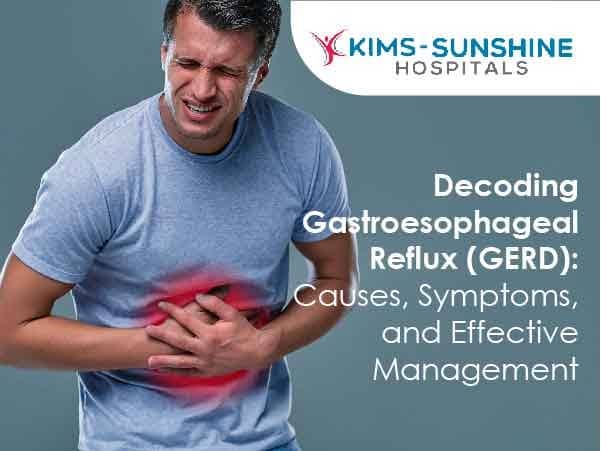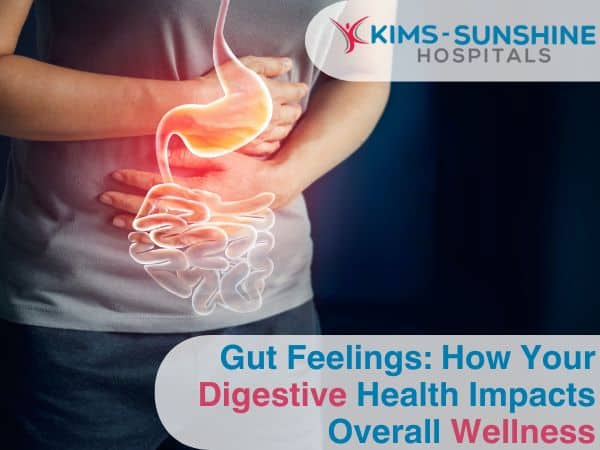
Decoding Gastroesophageal Reflux (GERD): Causes, Symptoms, and Effective Management
By Dr. J. Sai Harish Reddy MD, DM (Gastro)
 Introduction
Introduction
Imagine this: You’re at your absolute favourite restaurant. You’re savouring your favourite meal when suddenly, a fiery sensation is up in your chest, putting you up with irritation, anxiety and uneasiness. If you’ve experienced this, neither are you alone nor is this new. Millions suffer from Gastroesophageal Reflux Disease or GERD all around the world. This is an extremely common but misunderstood condition.
Join our spicy journey through the world of GERD! We’re spilling beans on its causes, symptoms, and sizzling tips to manage it. Say goodbye to heartburn, and let’s talk about relief!🔥
Interpreting GERD
The oesophagus is the tube in the body that connects a human’s mouth to their stomach. It is when stomach acid flows back from the stomach into the oesophagus that one has the chronic disorder of GERD. This acid backflow occurs when a muscular ring at the base of the oesophagus called the Lower Oesophagal Sphincter (LES) does not close properly. The acid exposure can lead or irritation, inflammation and damage to the esophageal lining over time.
Common Causes of GERD
- Dietary Choices: GERD symptoms are easily triggered by consuming large, fatty or extremely spicy meals, caffeine, alcohol and chocolate.
- Obesity: A factor that easily promotes GERD symptoms is excessive weight as it increases abdominal pressure and weakens the LES to promote acid reflux.
- Hiatal Hernia: Hiatal hernia occurs when a part of the stomach protrudes into the diaphragm, making acid reflux easier to approach the oesophagus.
- Pregnancy: Pregnancy in women brings about a lot of hormonal changes and increased abdominal pressure. This puts pregnant women at a higher risk of having GERD.
- Smoking: Smoking weakens the LES and disrupts saliva production, which helps neutralise stomach acid.
Identifying Symptoms
Not everyone who has GERD experiences the same symptoms. These can vary in time and intensity. Some of the most common GERD symptoms are:
- Heartburn: Heartburn is when one has a burning sensation in the chest cavity after a meal or while lying down
- Regurgitation: Regurgitation is the feeling of food or drink returning to the mouth.
- Chest Pain: Chest pain that mimics hear-relate conditions is a common symptom of GERD.
- Difficulty Swallowing: Difficulty in swallowing food and Dysphagia, or the sensation of food sticking in the throat other common symptoms of GERD.
- Chronic Cough: A persistent dry cough resulting from acid reflux.
- Sore Throat: Stomach acids can cause a sore, irritated throat.
Effective Management Strategies
GERD is an easily manageable condition. Some of the most effective ways to do so are:
- Lifestyle Modifications: Start making sustainable life choices like maintaining a simple exercise schedule and a more healthy meal plan.
- Dietary Changes: Look to opt for more frequent and healthier meal options. Don’t cut down completely on your favourite food, just have it in a controlled manner.
- Over-the-counter Medications: Temporary comforters can be found in the form of antacids or H2-receptor blockers to neutralise stomach acid or reduce its production.
- Prescription Medications: Proton Pump Inhibitors(PPIs) such as Proton pump inhibitors (PPIs) such as omeprazole or lansoprazole can be prescribed to reduce acid production in cases of severe GERD.
- Surgery: Surgeries to strengthen the LES, like fundoplication can help when dietary and lifestyle changes aren’t effective.
- Monitor Your Symptoms: Maintaining a log of your symptoms can help you figure out your triggers and analyse how effective your management plan is.
Conclusion
GERD is a common condition that affects millions, but it doesn’t have to control your life. By understanding its causes, recognizing symptoms, and implementing effective management strategies, you can gain control over GERD and enjoy a better quality of life. If you suspect you have GERD or if your symptoms persist despite self-care measures, consult a healthcare professional for a thorough evaluation and personalized treatment plan. Remember, with the right approach, you can decode GERD and put those uncomfortable sensations in your rearview mirror.
GERD is a common condition, that is experienced by millions around the world, but it doesn’t have to control your life. By understanding its causes, symptoms and treatments, and making simple lifestyle changes, you can regain control over your quality of life.
If you or someone you’re aware of is experiencing GERD, gastroenterological issues or any digestive health concerns, don’t hesitate to schedule an appointment at the Best Gastroenterology Hospital In Hyderabad, with our highly skilled gastroenterology specialists at KIMS-Sunshine Hospitals in Secunderabad. Our top-notch Gastro hospital near you offers expert medical guidance to improve your digestive health and make informed choices about your well-being.
FAQs
Q. How do you fix gastro-oesophageal reflux?
A. Lifestyle changes such as dietary changes, elevating the head during sleep, and weight management can help alleviate gastroesophageal reflux. Medications such as antacids and proton pump inhibitors can help. In severe cases, surgery may be required. For personalised advice, consult a healthcare professional.
Q. Can gastro-oesophageal reflux be cured?
A. GERD can often be effectively managed with lifestyle changes, medication, or surgery, but it is not always completely cured. The goal of treatment is to control symptoms and avoid complications. For personalised advice, consult a healthcare professional.
Q. What causes gastroesophageal reflux?
A. The primary cause of gastroesophageal reflux is a weakened lower esophageal sphincter (LES), which allows stomach acid to flow back into the oesophagus. Obesity, pregnancy, hiatal hernia, and certain foods and beverages are also risk factors.
Q. What are 4 symptoms of GERD?
A. Heartburn, regurgitation, persistent cough, and chest pain are symptoms of GERD, often worsening at night and causing discomfort and anxiety.
Q. Which is the best hospital for the treatment of gastro-oesophageal reflux disease (GERD)?
A. The best gastro hospital in Hyderabad for treating gastro-oesophageal reflux disease (GERD) is KIMS-Sunshine Hospital in Secunderabad, renowned for its exceptional gastroenterology specialists and dedicated medical team. Schedule your appointment at the leading Gastroenterology Hospital Near you for GERD treatment today.







